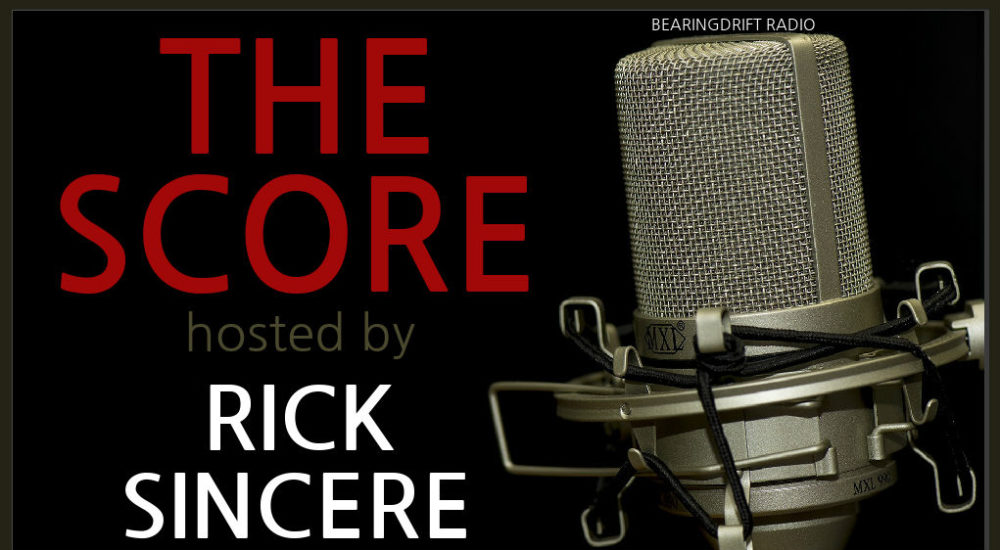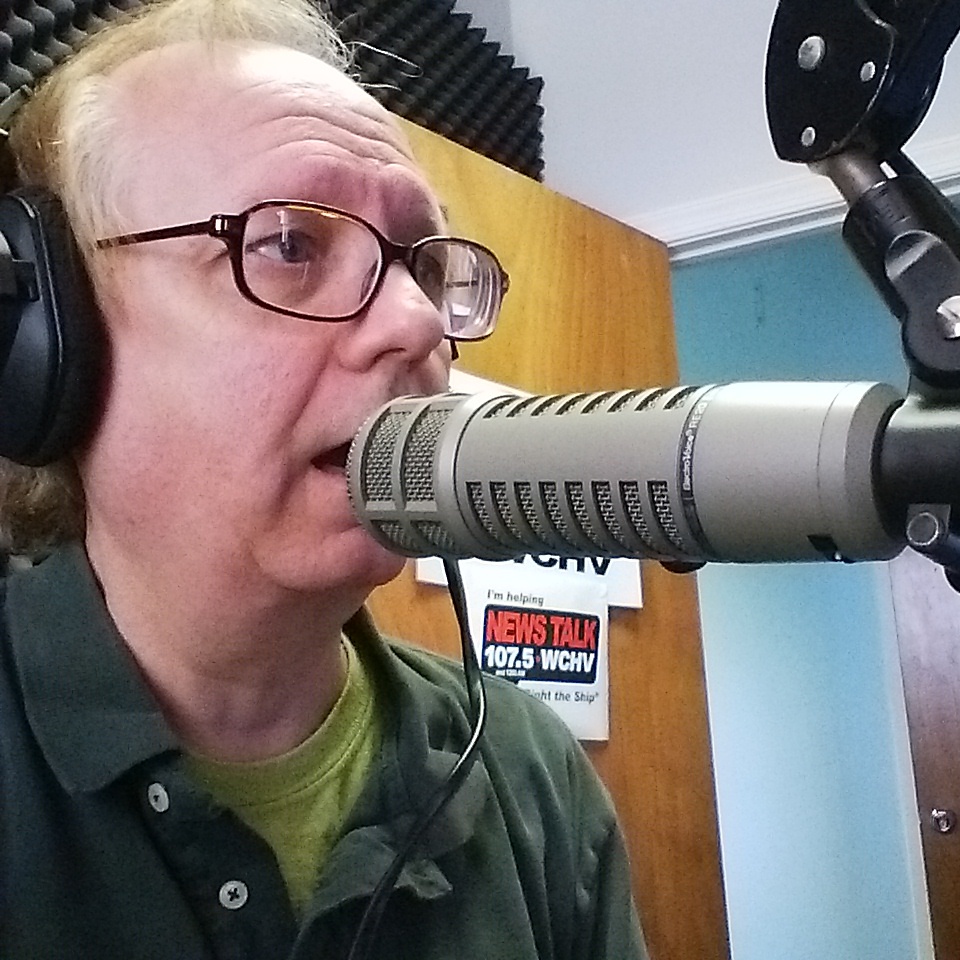The Score: Groundhog Day, Frigid Weather, Crony Capitalism, Shutdown Blues, Student Journalism
This week on The Score – What is the future of student journalism? Who is against crony capitalism? Where did the polar vortex come from and why is it making us so cold? Should we worry about the economic consequences of the federal shutdown?
Winter Is Coming (Still?)
This week’s episode debuts on Groundhog Day. We were going to start off with “I Got You, Babe,” by Sonny & Cher, but we were afraid you’d just press the snooze button and miss all the information and entertainment you’re about to hear.
By the time you do hear this show, you’ll know whether Punxsatawney Phil has seen his shadow and whether we’ll have six more weeks of winter.
Speaking of winter, our first guest today is Virginia state climatologist Jerry Stenger. I met him at his office at the University of Virginia so he could explain to us just what this polar vortex is and why it is bombarding us with brutally frigid temperatures.
Stenger noted:
One must remember that lot of cold air accumulates in the Arctic regions. It’s dark up there this time of year and [it] just gets colder and colder and sometimes that polar jet that circles the earth forms a wave in it that blows some of that very cold air down to the south. It leaves slightly warmer air further north, so lots of times it’s possible to have a very cold blast of air that’s actually colder than it is, say, at the North Pole.
This happens a lot in Siberia, too, in fact because the land mass in Russia is so large it tends to get much colder there than the surrounding water so there will very often be a slight shift where the the cold pole, if you will, is toward Siberia. In fact, sometimes it forms a second pole, in a sense, … so it’s not terribly unusual to have a flow that brings us colder air than you might see even at the North Pole.
Against Crony Capitalism
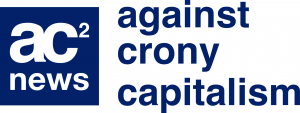 We hear a lot about corruption in government. Much of this entails what economists call rent-seeking, or using the government to favor one business against another.
We hear a lot about corruption in government. Much of this entails what economists call rent-seeking, or using the government to favor one business against another.
Our guest, Nick Sorrentino, prefers to call this “crony capitalism,” and he is the co-founder of a web publication called Against Crony Capitalism, which has been building content since 2011. Sorrentino is also author of the 2016 book, Politicos, Predators, Payoffs, and Vegan Pizza: Dispatches from the Crony Capitalism Wars.
Sorrentino argues that
Crony capitalism is kind of the default setting for a lot of human society, going back to Hammurabi and probably before him. People were lobbying for special privileges through the government and so on. So we have to understand that that’s just the way it is. Now that you know it’s like a fire that will always burn, to some degree, the question is do we want to pour gasoline on that fire? Do we want to control the fire? Of course we want to: we want to do everything that we can to suppress that.
Now how do we do that? Well, we limit the enabling factor, which to a large degree is government. Now this is counterintuitive to many of our friends on what is called the American left, who come to us and say, “Oh, we’re against crony capitalism. We need to regulate these guys into the ground.”
Well, we certainly understand that instinct. However, what a lot of people don’t understand is those [regulations] are almost always written by the special interests and there’s no way around that. The best thing one can do is reduce the state to the maximum degree possible and keep the economy as private as possible and in so doing, it won’t be perfect but it’ll be significantly more transparent and it will disempower the cronies in government.
That’s what we can do. And part of that is the public needs to be informed of it. People need to be ashamed of being a crony capitalist.
Economic Consequences of the Shutdown
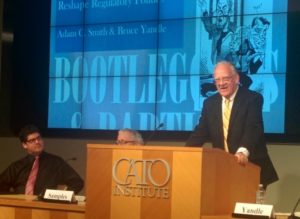 Starting just before Christmas, a big chunk of the federal government was shut down for more than a month. Federal employees missed two paychecks, which will be routed to them eventually, and federal contract workers were not paid at all.
Starting just before Christmas, a big chunk of the federal government was shut down for more than a month. Federal employees missed two paychecks, which will be routed to them eventually, and federal contract workers were not paid at all.
The economic consequences of the shutdown are far-reaching, as I learned by talking with our next guest, economist Bruce Yandle, who is a distinguished adjunct fellow at the Mercatus Center at George Mason University. Other observers agree. For instance, the Cavalier Daily reported that “The University [of Virginia] spent approximately $2 million to pay for projects and salaries normally funded by the federal government in order to keep research running during the partial government shutdown,” although reimbursement is likely.
In a piece he wrote for USA Today on January 25, Yandle noted
According to Chairman of the Council of Economic Advisers Kevin Hassett, some 0.13 percentage points was subtracted from growth for each week while the shutdown lasted. Five weeks means GDP growth is down by 0.65 percentage points, with more taken away each day. For a $20 trillion-plus economy, that’s $130 billion dollars on an annual basis.
This seems like a lot to pay to get a $5.7 billion wall along with other security-related initiatives along the U.S.-Mexican border.
Since individuals do not get billed directly when GDP growth falls, the loss is both everyone’s and no one’s in particular. Maybe that’s why a running tally of the GDP penalty doesn’t even make the evening news. We got frequent updates on the number of days and hours (and sometimes minutes) the government was closed, but no news on the ongoing cost.
More than thirty years ago, Dr. Yandle popularized the term “bootleggers and Baptists” to describe a phenomenon when people who seem to be opposed to each other join together in support of a government regulation. In this interview, he (possibly) coins another useful term: “bewilderment effect,” referring to business executives, investors, and others who can make neither heads nor tails out of the current administration’s economic policies, so it is difficult to plan for the future in terms of product development, plant expansion, hiring and layoffs, and so forth.
Among his many publications, Yandle is the co-editor (with James Miller and Robert MacKay) of Public Choice and Regulation: A View from inside the Federal Trade Commission (1987) and author of Common Sense and Common Law for the Environment (1997),
I spoke to Bruce Yandle by telephone from his office at Clemson University in South Carolina.
What Is Journalism For?
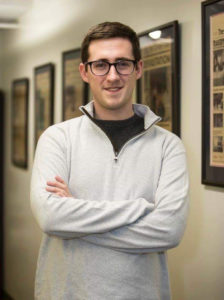 As anyone who reads newspapers, follows social media, watches TV, or listens to talk radio knows by now, the state of the news media in the United States and around the world has changed substantially in the past twenty years. Many familiar newspapers and magazines are now just memories.
As anyone who reads newspapers, follows social media, watches TV, or listens to talk radio knows by now, the state of the news media in the United States and around the world has changed substantially in the past twenty years. Many familiar newspapers and magazines are now just memories.
Does journalism have a future? I spoke to an optimistic journalist at the University of Virginia who says yes.
Tim Dodson spent a year as editor-in-chief of the Cavalier Daily, one of the nation’s oldest independent student publications (founded in 1890), until he passed his blue pen to Gracie Kreth about two weeks ago. We met at the newspaper’s office on the Grounds of UVA so I could ask him about the role played by student journalism in the media ecosystem.
In addition to his work with the Cavalier Daily, Dodson has interned at Monticello Media in Charlottesville (WCHV-FM), the Richmond Times-Dispatch, and Charlottesville Tomorrow, a non-profit that reports on land use, zoning, development, and related issues.
Dodson, who will be graduated from the University this May, noted that
…if I were to look at the broad range of things that we cover, the majority of it certainly is UVA, but when it comes to local news that’s probably another 20 to 30 percent of what we do. Then, when we cover national stories, they tend to be through the lens of “how does this impact college students? How does this impact UVA specifically?” So, for example, Title IX changes are being considered at the federal level, we might look at that and [report] how UVA officials feel about that [or] how UVA students feel about those changes that might be happening.
…if you look at local newsrooms, they are they are cutting jobs. The Daily Progress has certainly reduced its its staff levels over the years. I’m sure you could say similar things about other publications locally. In some ways, the CavDaily leads in a unique position here in Charlottesville, because i would say we’re the largest media organization, by far. It’s just people don’t necessarily think about that. (I think sometimes our staff doesn’t realize that, as well.)
So in some ways, while other media organizations are certainly cutting staff, because we’re nonprofit — because we’re student publication — we don’t necessarily feel the same pressures in the same way. So that does give us a lot of flexibility to cover things that perhaps other journalists or reporters might not be able to, given the other responsibilities that they have at their own publications.
As it happens, Dodson answered similar questions to the ones I posed this week in an interview with the Virginia Press Association last December.
From the Archives: Strange Bedfellows
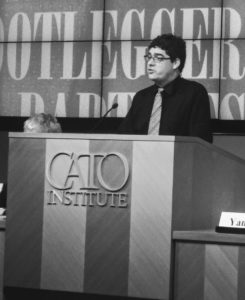 Earlier in the program, we spoke to Dr. Bruce Yandle about the government shutdown. Just over four years ago, I interviewed his grandson, who is also an economist. Adam Smith collaborated with Dr. Yandle on a book called Bootleggers & Baptists: How Economic Forces and Moral Persuasion Interact to Shape Regulatory Politics. In this interview from the archives, I asked Dr. Smith about the origins of the bootleggers and Baptists concept.
Earlier in the program, we spoke to Dr. Bruce Yandle about the government shutdown. Just over four years ago, I interviewed his grandson, who is also an economist. Adam Smith collaborated with Dr. Yandle on a book called Bootleggers & Baptists: How Economic Forces and Moral Persuasion Interact to Shape Regulatory Politics. In this interview from the archives, I asked Dr. Smith about the origins of the bootleggers and Baptists concept.
Smith explained that the term “bootleggers and Baptists” originated during alcohol Prohibition in the 1920s, when “you had bootleggers and Baptists with aligned interests” even if they did not realize it.
Baptists, he explained, proclaimed “Down with legalized distribution of alcohol!” because they saw drinking as morally detrimental. Bootleggers, too, proclaimed “Down with legalized distribution of alcohol!” because Prohibition raised the price of illegal liquor and fed more profits to the bootleggers.
“It was a boon to the bootleggers,” Smith explained, “and the Baptists were kind of oblivious to that situation.”
Broadening the concept to include other kinds of regulations, Smith said, “what we see today in our modern political economy [are] many, many manifestations of the same kinds of strange bedfellows.”
(This interview with Adam Smith dates to October 2014, after he and Yandle spoke on a panel at the Cato Institute.)
Next week’s episode of The Score is still in pre-production. If you have suggestions for guests or topics, please note them in the comments area, below.
